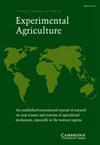Fertilizer use in conventional cereal production in northern Greece: Mapping gaps for improving sustainability
IF 1.9
4区 农林科学
Q1 Agricultural and Biological Sciences
引用次数: 0
Abstract
Summary Optimizing fertilizer use in intensively cropped soils is essential, but knowledge of related issues among farmers is lacking. The present study assessed farmers’ perceptions of fertilizers and practices of fertilizer use in intensive cereal production in rural areas of Evros in northern Greece. In total, 250 cereal farmers were chosen for this study, and more than half of the farmers (53.6%) perceived that chemical fertilizers are hazardous, corroborating a general perception of chemophobia. Nevertheless, almost all farmers (98.8%) stated that they applied fertilization in their cereal production. Among them, 82.8% applied inorganic fertilizers, 9.2% applied green manure, 4.4% applied animal manure, and 3.6% applied commercial organic fertilizers. Most farmers used rates within the recommended rates in cereal production, while 12.9% and 6.2% of the farmers reported fertilization rates that were significantly lower or higher than those recommended for the area, respectively. Almost half of the farmers (48.8%) stated that they often use slow-release fertilizers and 30.8% stated that they frequently use foliar-applied fertilizers in cereals. Most farmers (57.2%) never kept records of annual fertilizations, while two-thirds of the farmers (66.4%) never asked for a soil analysis. Overall, most farmers (52.0%) showed traditional behavior, while only 5.2% showed innovative behavior in fertilizer use. Multiple regression analysis revealed that the innovative behavior was promoted by large-scale farmers, farmers who applied crop rotation, and farmers who perceived inorganic fertilizers as harmful. Moreover, large farm size and favorable attitudes concerning organic fertilizers were significantly associated with organic fertilizers use.希腊北部传统谷物生产中的肥料使用:绘制提高可持续性的差距
摘要优化集约种植土壤中的肥料使用至关重要,但农民对相关问题缺乏了解。本研究评估了希腊北部埃夫罗斯农村地区农民对化肥的看法和在集约谷物生产中使用化肥的做法。这项研究总共选择了250名种植谷物的农民,超过一半的农民(53.6%)认为化肥是危险的,这证实了人们对化学恐惧症的普遍看法。然而,几乎所有农民(98.8%)都表示,他们在谷物生产中应用了施肥。其中,82.8%施用无机肥料,9.2%施用绿肥,4.4%施用动物粪便,3.6%施用商品有机肥料。大多数农民在谷物生产中使用的施肥率在建议的范围内,而12.9%和6.2%的农民报告的施肥率分别明显低于或高于该地区的建议施肥率。近一半的农民(48.8%)表示他们经常使用缓释肥料,30.8%的农民表示他们经常在谷物中使用叶面施肥。大多数农民(57.2%)从未记录过年度施肥情况,而三分之二的农民(66.4%)从未要求进行土壤分析。总体而言,大多数农民(52.0%)在化肥使用方面表现出传统行为,而只有5.2%的农民表现出创新行为。多元回归分析表明,规模农户、轮作农户和认为无机肥料有害的农户促进了创新行为。此外,大型农场规模和对有机肥料的良好态度与有机肥料的使用显著相关。
本文章由计算机程序翻译,如有差异,请以英文原文为准。
求助全文
约1分钟内获得全文
求助全文
来源期刊

Experimental Agriculture
农林科学-农艺学
CiteScore
2.50
自引率
6.20%
发文量
29
审稿时长
24 months
期刊介绍:
With a focus on the tropical and sub-tropical regions of the world, Experimental Agriculture publishes the results of original research on field, plantation and herbage crops grown for food or feed, or for industrial purposes, and on farming systems, including livestock and people. It reports experimental work designed to explain how crops respond to the environment in biological and physical terms, and on the social and economic issues that may influence the uptake of the results of research by policy makers and farmers, including the role of institutions and partnerships in delivering impact. The journal also publishes accounts and critical discussions of new quantitative and qualitative methods in agricultural and ecosystems research, and of contemporary issues arising in countries where agricultural production needs to develop rapidly. There is a regular book review section and occasional, often invited, reviews of research.
 求助内容:
求助内容: 应助结果提醒方式:
应助结果提醒方式:


